
The National Research Council of Thailand (NRCT) has announced the 2023 NRCT Award Winners to honor outstanding researchers with the purpose to promote research and development in Thailand. The ceremony was held on 4 February 2023 at Bangkok International Trade & Exhibition Centre, Thailand. BIOTEC’s researchers won several awards. The winners were congratulated by Dr. Wonnop Visessanguan, Executive Director of BIOTEC.
Research Award
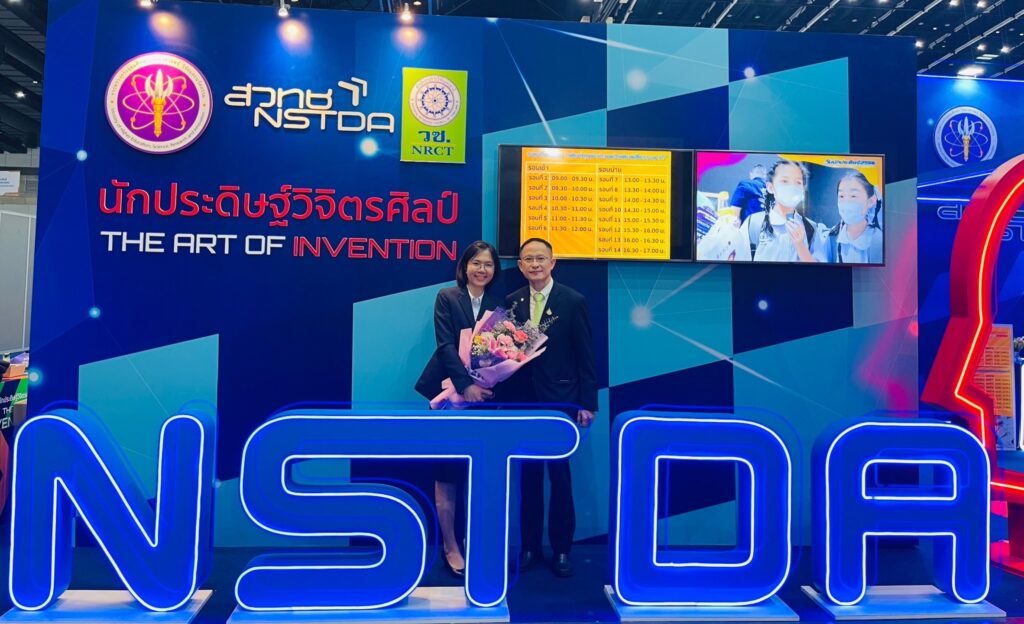
Dr. Anan Jongkaewwattana, Director of Veterinary Health Innovation and Management Research Group, and Dr. Challika Kaewborisuth, Researcher from Virology and Cell Technology Research Team, received the 2023 NRCT’s Excellent Research Award in Agricultural Science and Biology for their project entitled “Role of ORF3 protein in replication and virulence of porcine epidemic diarrhea virus (PEDV) for live attenuated vaccine development application.”

This study demonstrates that PEDV ORF3 plays important roles in virus replication and pathogenesis as well as in host-virus interaction. Expression of PEDV ORF3 was found in ER-Golgi secretory pathway of host cells and the ORF3 protein is crucial for PEDV replication in cultured cells. The ORF3 protein also interacts and functions synergistically with the PEDV spike protein, suggested the role of ORF3 as a virulence factor. In addition, this PEDV ORF3 protein interacts with endolysosomal proteins and immune signaling pathway relate proteins of host cells, manipulating viral proliferation and immune evasion. These findings could be beneficial for infectious clone design to generate a promising live-attenuated PEDV vaccine candidate by reverse genetics, preventing the enteric disease with high mortality in swine and economic losses for the swine industry in Thailand and other countries.
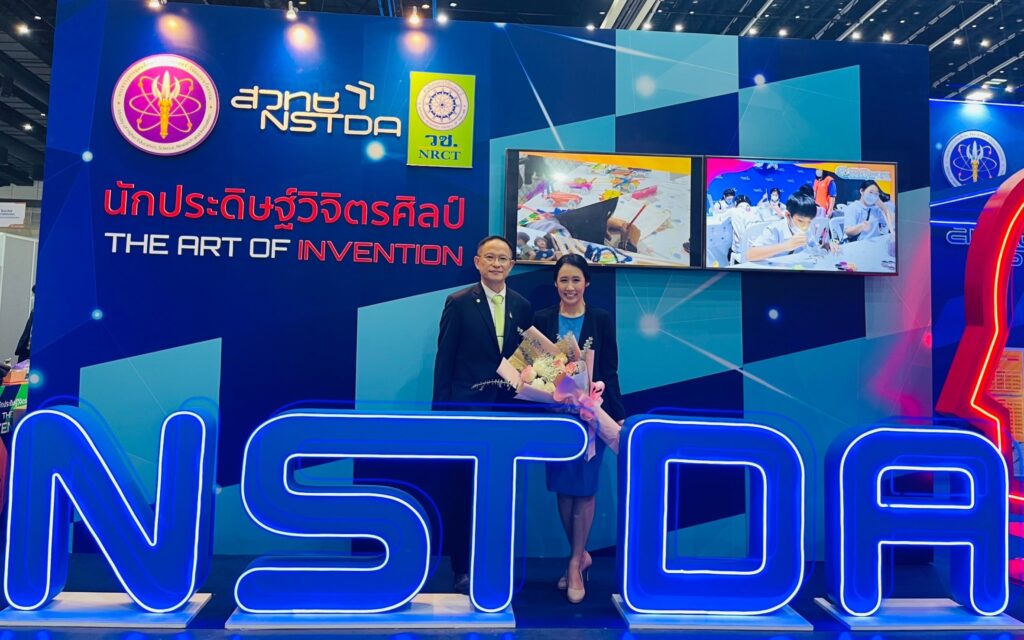
The project entitled “Genome Sequencing of the black tiger shrimp for aquaculture industry” won the 2023 NRCT’s Research Award in Agricultural Science and Biology. The project was led by Dr. Nitsara Karoonuthaisiri, Dr. Tanaporn Uengwetwanit, Ms. Kanchana Sittikankeaw, Ms. Pacharaporn Angthong from Microarray Research Team, Dr. Wanilada Rungrassamee, Director of Biosensing and Bioprospecting Technology Research Group and Ms. Chutima Sonthirod and Dr. Wirulda Pootakham from National Omics Center. The project has been carried out in collaboration with Dr. Thidathip Wongsurawat and Dr. Piroon Jenjaroenpun from the Faculty of Medicine Siriraj Hospital, Mahidol University, Assoc. Prof. Inthawat Nookaew, University of Arkansas for Medical Sciences, Prof. Dr. Vitor Martins dos Santos, Assoc. Prof. Dr. Peter Schaap and Dr. Jasper Jan Koehorst from Wageningen University and Research, the Netherlands and Dr. Frederic Tangy, Director of Research French National Centre for Scientific Research and Head of Viral Genomics and Vaccination Unit, Institute Pasteur, France.

The team is the first one in the world to obtain the first high-quality chromosome-scale genome assembly of the economically important P. monodon. The combination of various approaches of next-generation sequencing employed enabled the successful assembly of the high-quality genome sequence at the chromosome level. The final assembly covered 2.39 Gb which is 92.3% of the estimated genome size which is the highest quality draft genome sequence ever reported for P. monodon. The availability of the genome assembly provides a resource for genetic improvement and breeding penaeid shrimp in aquaculture and enables analyses of ecological impact, environment adaptation and evolution. The breakthrough has contributed to several impactful research works such as the investigation of the synergistic effects of unilateral eyestalk ablation and the live feed supplements and the identification of SNP specific sex marker.

The project entitled “Nanocellulose from Sugarcane Bagasse: Knowledge Utilization for the sustainability of the Thai sugar industry” was recognized for the 2023 NRCT’s Research Award in Agricultural Science and Biology. Dr. Thidarat Nimchua, Leader of Enzyme Technology Research Team, in collaboration with Assoc. Prof. Prakit Sukyai and Sukyai’s colleagues from Kasetsart University were responsible for this work.
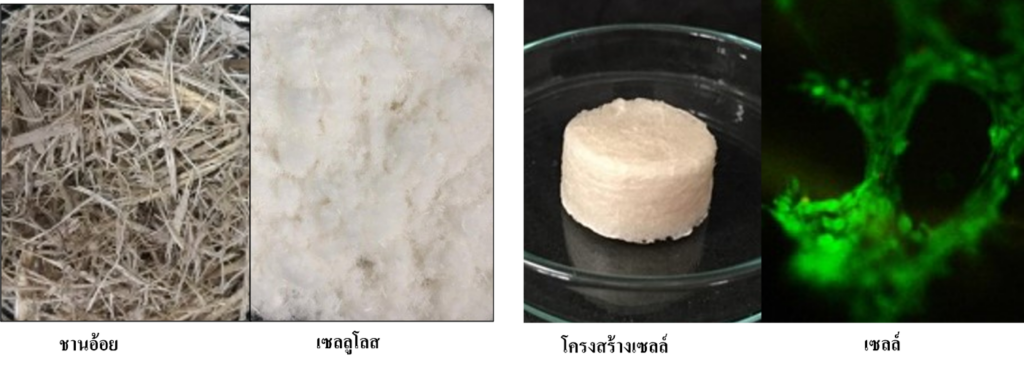
The team extracted cellulose and nanocellulose from sugarcane bagasse using environmentally friendly enzymatic pretreatment included xylanase and mixture of xylanase and laccase. Additionally, cellulose extraction from sugarcane bagasse was demonstrated using simulated elephant colon pretreatment to reduce chemical and production cost. Moreover, the obtained cellulose and nanocellulose was shown to be a promising candidate for tissue engineering materials and functional ingredients in food products.
This research indicated the eco-friendly technology for cellulose and nanocellulose extraction using biological pretreatment process as well as application of the obtained cellulose in fat-replaced sausage and utilization of the retrieved nanocellulose in enhancing of the proliferation, attachment, and differentiation of preosteoblast cells for tissue engineering.
Knowledge and technology obtained from this research can be utilized in the form of international academic journals and teaching while the application of cellulose and nanocellulose to create new and high-value products can generate interest from the private sector. These lead to the development of several joint research projects and the expansion of the bagasse-based industry for creating the sustainability of the sugar industry in Thailand.

In collaboration with Prof. Pimchai Chaiyen’s team at Vidyasirimedhi Institute of Science and Technology (VISTEC) and Asst. Prof. Narin Lawan at Chiang Mai University, Dr. Penchit Chitnumsub, Principal Researcher of Biomolecular Analysis and Application Research Team, received the 2023 NRCT’s Research Award in Chemistry and Pharmacy for their work entitled “Mechanistic Studies and Rational Engineering for Increasing Catalytic Capability of a Flavin-Dependent Halogenase.”

Successful rational engineering of Flavin-Dependent Halogenase (FDH), an important biocatalyst for preparing regioselective halogenated pharmaceutical compounds, with multiple catalytic improvement has been highlighted. Tryptophan 6-halogenase (Thal) was used as a model enzyme in this study. An in-depth mechanistic kinetics and crystal structures of substrate complex and cofactor complexes of Thal were studied and used to target hotspots for enzyme engineering and the impacts of the mutation were explored by molecular dynamic simulation. Leakage of hypohalous acid ( HOX; a halogenating intermediate) from the enzyme active sites was identified as a major cause of low catalytic efficacy of Thal. Thus, amino acid residues constituting a channel connecting the two active sites were engineered and the mutation at position 82 from valine to isoleucine (Thal-V82I) was characterized as the best variant in reduction of HOX leakage and catalysis improvement. This mutation changes the tunnel hydrophobic interactions which regulates tunnel dynamics and causes water network rearrangement, resulting in Thal-V82I variant with higher thermostability and 12-fold greater catalytic efficiency than the wildtype. This work offers an effective strategy to improve biocatalyst for suitable industrial applications.
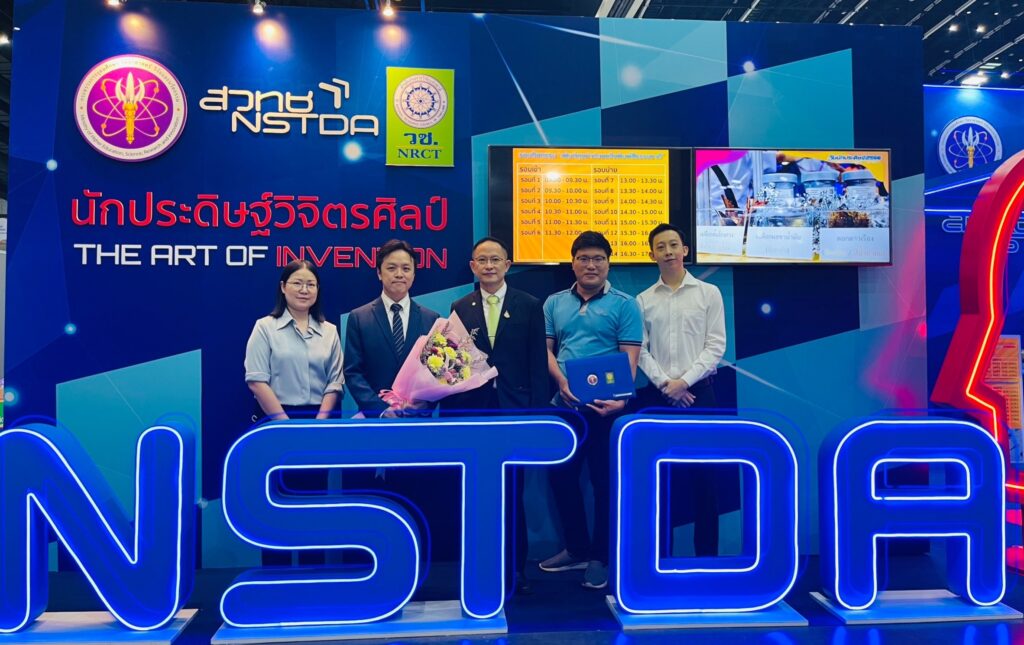
The project titled “Development of pre-pilot-scale organosolv fractionation process for lignin and co-product from agricultural wastes for application in BCG industry” was honored with the 2023 NRCT’s Research Award in Engineering and Industry Research. The project was led by Dr. Verawat Champreda, Director of Biorefinery and Bioproduct Technology Research Group, Dr. Chayanon Chotirotsukon, Dr. Marisa Raita from Biorefinery and Bioproduct Technology Research Group in collaboration with Prof. Dr. Navadol Laosiripojana and Dr. Suchart Pongchaipol from the Joint Graduate School of Energy and Environment, King Mongkut’s University of Technology Thonburi (KMUTT), and Dr. Nopparat Suriyachai from University of Phayao.

The project focuses on the development of an organosolv-based clean fractionation process for the separation of agricultural waste including sugar cane bagasse, wood chips and palm waste. The technology could extend the utilization of biopolymers which can be isolated by scaling up the fractionation process of lignin, the most abundant polymer of aromatic compounds in nature, to Thailand’s first pre-pilot scale using the organosolve process. The team has successfully designed and fabricated the batch and flow-through reactor systems and downstream processing, enabling the production of high-purity lignin for use in plastic and chemical materials. Moreover, co-products such as cellulose and hemicellulose with desirable functional properties e.g. UV protection and antimicrobial are obtained.
The developed process has a short payback period of 2.0-3.8 years, based on the assumption of raw material of 1 ton per day, making it economically feasible. The technology platform is commercially viable as the team has collaborated with major companies such as PTT Group, Mitr Phol Group, Thai Rung Ruang Sugar Group, Energy Absolute public Company Limited, as well as local SMEs and start-ups.
Invention Award
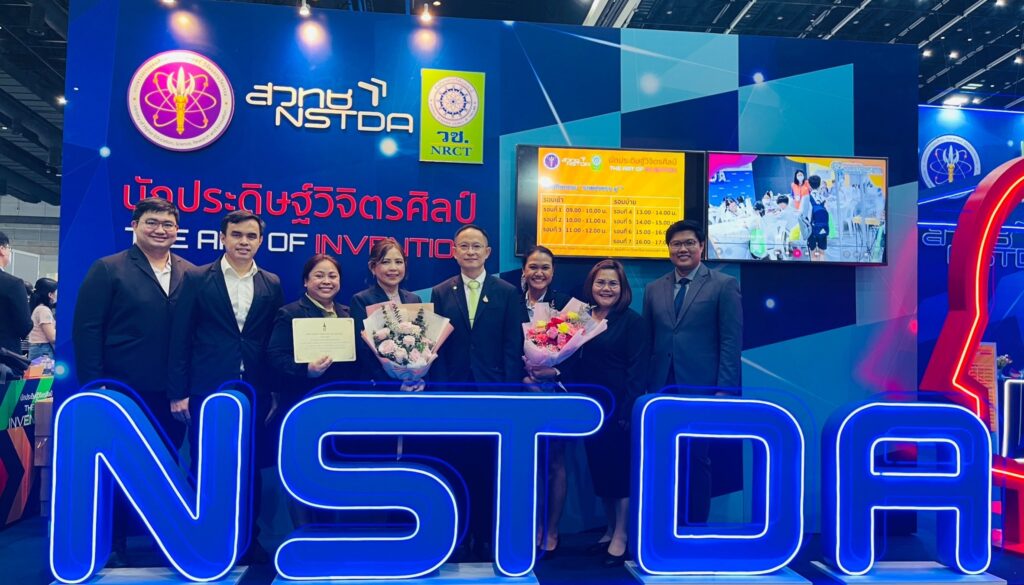
PigXY-AMP – a sensitive and rapid one-step colorimetric loop-mediated isothermal amplification (LAMP) detection kit for African swine fever virus (ASFV) – was awarded the 2023 NRCT’s Invention Award in Agricultural Science and Biology. The invention is a coalition effort led by Mrs. Wansika Kiatpathomchai, Team Lead of the Bioengineering and Sensing Technology Research Team, and her team, including Mr. Rapheephat Suvannakad, Ms. Jantana Kampeera, Mr. Narong Arunrut, Miss Sirintip Dangtip, and Miss Benyatip Tondee, in collaboration with Dr. Anan Jongkaewwattana, Director of Veterinary Health Innovation and Management Research Group, Dr. Sithichoke Tangphatsornruang, Director of National Omics Center (NOC), and Mr. Nattapol Narong, Research Assistant, NOC.

African swine fever (ASF) causes economic losses to the swine industry in Thailand. The public and private sectors have been collaborating to prevent and control the disease, which requires early diagnosis with high accuracy and sensitivity to detect the disease before it spreads. In order to help the industry mitigate the threat, the team successfully invented PigXY-AMP, which was designed to be rapid and simple for both sample preparation and LAMP detection steps. PigXY-AMP includes a 15-minute rapid extraction solution ideal for dried-blood swab specimens, which simplifies the collection of pig samples and reduces the need for labor-intensive genome extraction or specialized equipment. PigXY-AMP includes 96 tubes with ready-to-use LAMP reagents that incorporate the Xylenol Orange (XO) pH-sensitive dye for easy naked-eye readout. This platform reduces the workflow following sample addition to a single step and is easy to apply at farms with limited resources. It takes only 15 minutes to prepare the sample and 60 minutes to complete the reaction. The performance of PigXY-AMP was comparable to that of the real-time polymerase chain reaction (PCR) approach; the sensitivity, specificity, and accuracy for detecting ASFV were all 100 percent. The kit’s dye changes color from purple to yellow, indicating detection of ASFV (positive), while it remains purple, meaning no detection of the virus (negative). Overall, PigXY-AMP enables in-field diagnosis of ASF, contributing to early disease screening and control in the swine industry and reducing the need for expensive test kits to be imported since it can be manufactured locally.
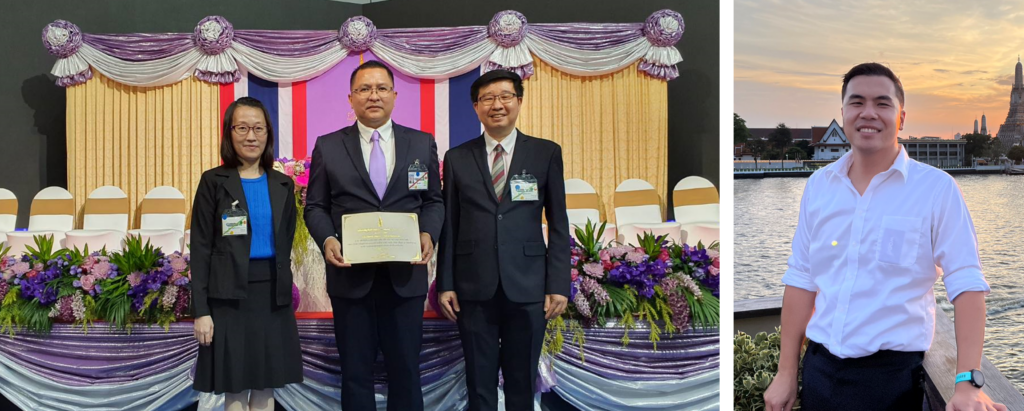
The invention titled “Web geographic information system map (Web GIS Map) for corrosion rate of structural steel in Thailand” was honored with the 2023 NRCT’s Outstanding Invention Award in Information Technology and Communication Arts. The corrosion map was established from three MTEC-funded projects led by Dr. Ekkarut Viyanit (2007-2009), Dr. Amnuaysak Chainpairot (2012-2015), and Dr. Wanida Pongsaksawad (2018-2020), Rail and Modern Transports Research Center (RMT), MTEC. Devoted team members include Dr. Pitichon Klomjit, Senior Engineer, Research and Development Bioscience and Biotechnology for Industry, BIOTEC, along with Mr. Sikharin Sorachot (NSTDA), Dr. Namurata Palsson (Sweden), and RMT Senior Engineers, including Mr. Piya Khamsuk, Mr. Siam Kaewkumsai, Mr. Kosit Wongpinkaew, Mr. Witsanupong Khonraeng, Mr. Nirut Bunchoo.

Commenced in 2007, the project aimed at studying atmospheric corrosion in Thailand in order to create a database of structural metallic materials. Exposure test on representative coupon samples have been carried out at various test sites with the wide range of atmospheric environment. Climate data, chloride, and sulfur dioxide were collected. Corrosion rate data were obtained via electrochemical sensors and weight loss method. The result demonstrates correlation between corrosion rate and environmental variables as well as corrosion current measured by sensor. The team later collected corrosion behavior data of various types of metallic materials and extended the scope of study to cover various atmospheric conditions in Thailand. In 2020, Thailand’s first corrosion maps (https://thaicorrosionmap.mtec.or.th/) for structural metallic materials was established based on the predictive model from field exposure test results. With the corrosion rate data, steel infrastructures can be designed and maintained according to service environment in order to improve safety and reduce life cycle cost.
Dissertation Award
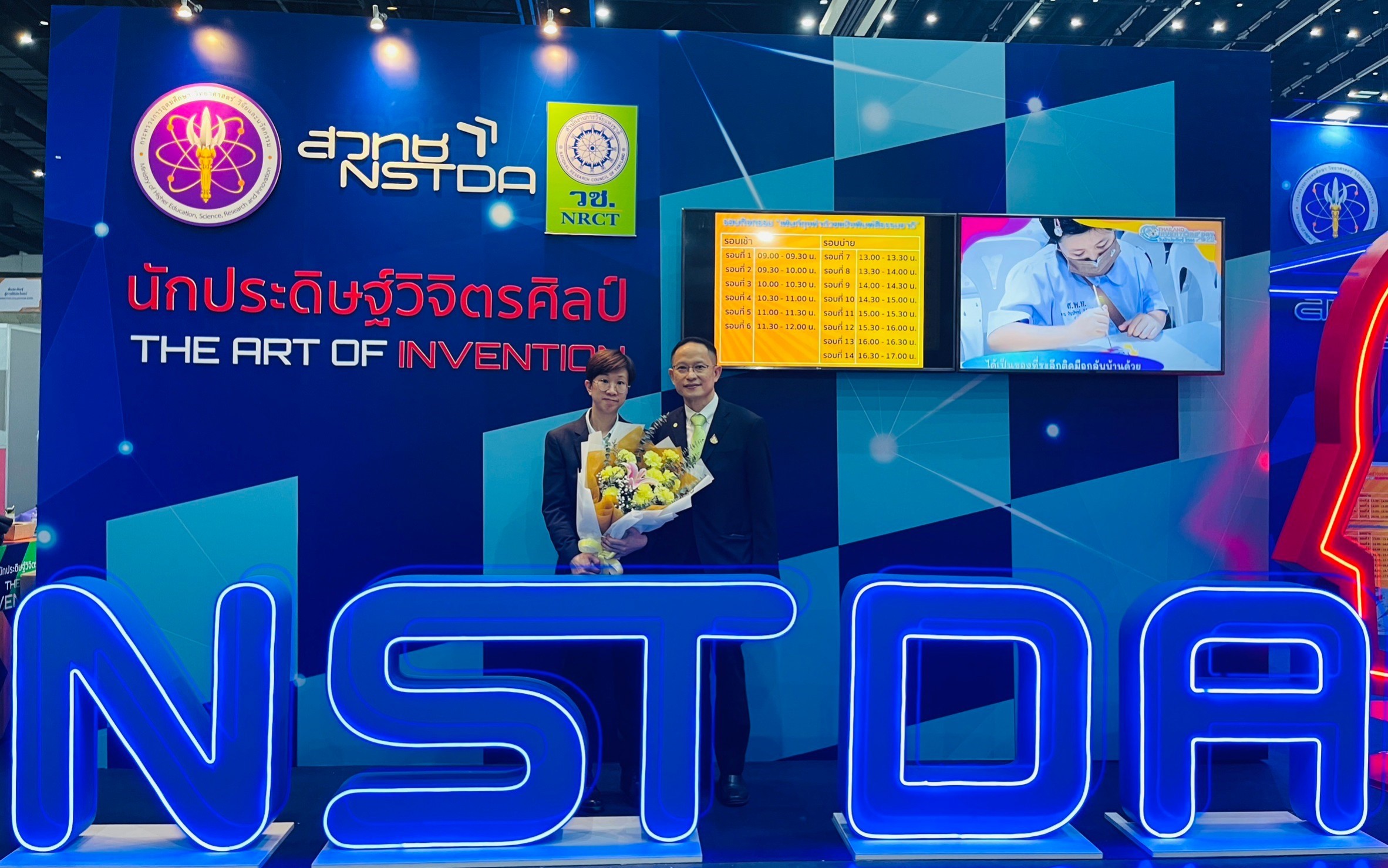
The doctoral dissertation entitled “Salt tolerant gene identification in rice using chromosome substitution line with “KHOW DAWK MALI 105 rice genetic background” by Dr. Panita Chutimanukul, Researcher of Innovative Herbal Plant Factory Research Team under the supervision of Prof. Dr. Supachitra Chadchawan, Faculty of Science at Chulalongkorn University, won the 2023 NRCT’s Excellent Dissertation Award in Agricultural Science and Biology.

This thesis aims to identify the salt tolerant gene and its duty on chromosome segment substitution line (CSSL) of ‘Khao Dawk Mali 105 (KDML105)’ rice, containing various regions between RM1003 and RM3362 markers on chromosome 1 of DH212 rice, which was expected to contain the full putative salt tolerance genetic region. The CSSL populations were used to evaluate the photosynthesis performance under salt stress. The most salt tolerant CSSL was selected for genomic and transcriptomic analysis to identify the rice candidate genes conferring salt tolerant phenotype.
The prediction of genes influences plant salt tolerance, whole genome sequence of CSSL16 was compared with KDML 105. The PsbS1 is one of ten genes showed the adaptability and maintenance of photosynthetic activities in salt-stressed rice. Moreover, the characterization in Arabidopsis mutant line carrying T-DNA insertion of AtCP22, which the homologous gene in PsbS1 of rice supported the role of this gene salt tolerance displaying a higher potential in photoprotection in plant under salt stress. Based on transcriptomics approach, the CSSL 16’s transcriptomes at seedling and booting stage under normal and salt stressed showed 57 genes increasing in edges connected under salt stress, when compared to the data from the normal grown plants. However, 4 genes of those genes from CSSL16 contained the SNPs on chromosome 1 between RM1003 and RM3362 markers. This discovery could be developed to improve rice breeding to be salt tolerant in the future and it is benefit for rice breeding and academicians. In addition, genomics approach and transcriptomics analysis of salt tolerant could be further analysis and applied to study other characteristic of rice chromosomes or other crops as it could help reduce time and budget of study.
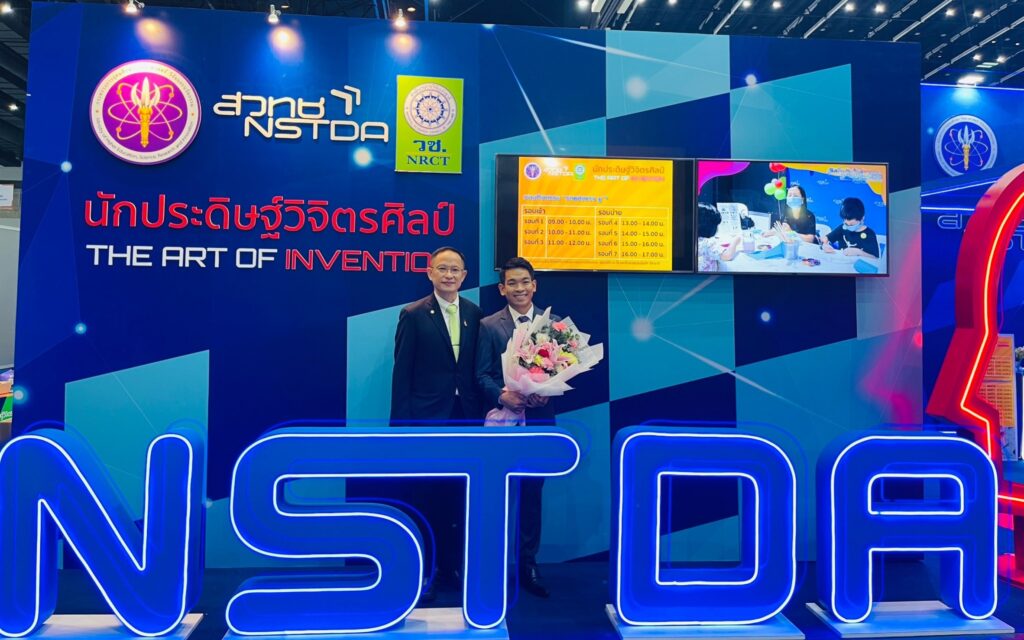
Dr. Teerawat Wiwatpanit, Researcher from Frontier Biodesign and Biomolecular Engineering Research Team, received the 2023 NRCT’s Dissertation Award in Medical Sciences for his doctoral dissertation on “Role of Specialized Mucolipin-Endowed Lysosomes.” The project was conducted under the supervision of Associate Prof. Jaime García-Añoveros, Feinberg School of Medicine at Northwestern University, U.S.A.

The study examined the subcellular basis of lysosomal channel mucolipins 3 and 1 in infants’ intestinal enterocytes and auditory hair cells to understand the molecular basis of the milk-absorptive intestinal cells in infants and the cause of hearing loss. Mucolipins are lysosomal cation channels with high permeability to calcium ions that help regulate endolysosomal trafficking system. While mucolipin 1 is expressed in all cells, mucolipin 3 is expressed in a small subset of cells (i.e., intestinal enterocytes of infants, melanocyte, and inner ear hair cell).
In the infant intestinal system, mucolipins 3 and 1 were expressed at high level in the infant enterocytes but they subsided by weaning. Mice lacking both mucolipins, but not either one alone, had severely vacuolated enterocytes. The study demonstrated that these enlarged vacuoles resulted from the failure of the endolysosomal mucolipins to perform lysosomal scission after the completion of intracellular digestion of milk. These abnormal vacuoles then interrupted subsequent endocytosis of milk proteins into the cells leading to growth defect in test animals. The research showed that the disruption of this specialized endolysosomal system may cause pediatric intestinal disease in human infants.
The study also revealed that the auditory hair cells have lower level of endocytosis in the absence of mucolipins 3 and 1. Mice lacking mucolipins 3 and 1, but not either one alone, suffered early-onset age-related hearing loss due to auditory outer hair cell death. In this case, mucolipins primarily played a role in maintaining long-term survival of the auditory hair cells, hence the maintenance of hearing. Outer hair cells lacking mucolipins contained enlarged lysosomes that were permeabilized, thus allowing toxic hydrolases into the cytoplasm that trigger cell death pathways.
Understanding of this selective co-expression of the mucolipins can help explain how they contribute to these cells’ unique characteristics leading to treatments for infant intestinal disorders and hearing loss in adults. More important, the knowledge gained from this study can be used for gene therapy and drug development targeting the specialized mucolipin-endowed lysosomes to prevent and cure these intestinal defects in infants and reverse hearing loss.
